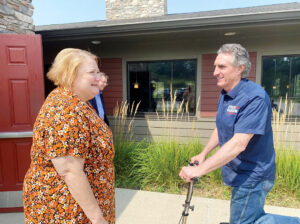Burgum’s answers on rural, small-town economic battle with ‘Generica’ suburbs
11/1/2023
Republican presidential candidate Doug Burgum speaks with Crawford County Republican leader Gwen Ecklund in Denison recently. He used a walking-assistance device in the wake of a recent pickup basketball injury. (Photo By Douglas Burns)
It’s the defining issue in Iowa. Heartbreak in rural towns. Heave-ho construction in the suburbs.
Framing it further, we are talking about rural decline versus the explosive growth in certain corridors, the economically bulging Des Moines suburbs and the Iowa City-Cedar Rapids corridor.
But it is such byzantine business that few politicians really dig into it.
And although it should be what every rural Iowan factors most heavily into their voting decisions, few do.
Drive into Des Moines through Grimes or Altoona and each week you witness development happening at breakneck speed — as if you are viewing it through a time-lapse lens that accelerates the video at thousands-of-times normal speed. Meanwhile, we see dwindling downtowns and atrophying aspirations in sweeps of rural Iowa.
Is it just the market, the invisible hand of capitalism — inevitable, this great intra-state migration of optimism and energy from rural Iowa to the cities?
I’ve asked versions of this question to candidates at all levels for the better part of three decades.
North Dakota Gov. Doug Burgum, a Republican presidential candidate, clearly understands the stakes and the scope of what is a rural crisis as well as anyone of either party I’ve interviewed.
“I’m just a small-town kid,” Burgum says.
Burgum hails from Arthur, North Dakota, a community of about 300 people. He worked his way through college, North Dakota State University, sweeping chimneys and went on to earn a master’s in business administration from Stanford University and founded a tech company, Great Plains Software, an organization so successful that Microsoft acquired it.
I talked with Burgum following a town hall in Denison, a western reach of the state, at some length about rural economic development, why small towns are struggling, his thoughts on suburbs. At one point, thinking we were done and respectful of his need to leave Denison for other cities, I turned off my tape recorder. He smiled, told me to turn it back on, that rural development was his wheelhouse, that he had more to say, even if it made him late for an upcoming tour.
And Burgum had a lot to say about small towns, rural America, and our relationship with the growing cities. Burgum has a command of small-town, ag-based life, that is on the level with U.S. Sen. Charles Grassley, R-Iowa, and former U.S. Sen. Tom Harkin, D-Iowa.
“I think that a lot of the edge growth you see in American cities, around the rings, some of it is market forces, but there’s a lot of federal subsidies that support that,” Burgum said. “It starts with the DOT (Department of Transportation.) Go to any city in America that’s suburban, that all looks the same, that I’ll call ‘Generica’ — they have strip malls, malls and drive-through restaurants — and you look at your speedometer. You are on a ‘Strode.’ A Strode is neither a street or a highway.”
Often the highways are multi-lane, constructed with large percentages of the budget filled with federal money, and suited for big box stores and nationally owned chains — all of which thrive at the expense of central business, old downtown, small businesses, Burgum said.
“No developer, no community, would ever say, ‘I think we are going to build an 11-lane-wide thing on the edge to support businesses that are going to crush our homegrown local businesses,’ ” Burgum said. “No one would do that if it was their money. Then if the federal government is going to give you 80%, then, well, like they better take it.”
So called “edge development” is not good for cities and small towns, he said.
“Capital has been flowing to the edge all over America because we have made it very profitable for edge developers because of federal subsidies,” Burgum said.
Burgum said it is possible to map cities, small towns, just as farmers do with fields, to determine the most productive property. The downtowns, even in smaller communities, can function with fewer property taxes, giving residents and businesses more value than “edge developments,” he said.
“On the thin edge, it’s all red because they consume more in resources than what they actually produce in revenue, by a lot,” Burgum said. “The bright, shiny new edge is a money loser for taxpayers, the old, dilapidated downtowns. I’m telling you, in every town I’ve been in Iowa, it’s the same thing. I’ve done it in small towns in North Dakota. We’ve hired the analysts. We’ve done it. You can take a town that’s a 1,500-person community and their main street, even if it’s only half full, is still a money maker — and the new Dollar General out on the edge, loser.”
A political comment from author John Irving in Iowa City
The author John Irving returned to Iowa City a few weeks ago where he spoke to a sell-out crowd at Hancher Auditorium. Irving is an alum (as a teacher and student) at the University of Iowa Writers’ Workshop. Big point: Irving studied with the late author Kurt Vonnegut at Iowa.
The most political question of the evening came from an audience member who asked Irving if, as a former wrestler and someone who cares about America, he had any thoughts on U.S. Rep. Jim Jordan, R-Ohio, a conservative firebrand at the center of turmoil in the speaker-less House — and a potential Speaker of the House himself.
Jordan was a two-time NCAA wrestling champion at the University of Wisconsin. Irving was a high school and college wrestler and coach — and is in the National Wrestling Hall Of Fame.
“Because I am partial to Big 10 wrestling, I remember being happy for Jim Jordan when he won those NCAA titles for Wisconsin. I don’t believe I have wished him well since,” Irving said.
The line drew some of the most sustained applause of the evening for Irving. ♦
Douglas Burns of Carroll is fourth-generation journalist and founder of Mercury Boost, a marketing and public relations company.
























